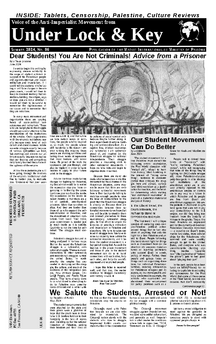
Oregon Censoring the Wrong Newspaper
12/9/2007
MIM,
What’s good? Check it out. I just had my review for the publication violations for MIM Notes that I sent you last month and the violation stands. They’re reasoning is that due to the fact that my comrades are reporting the very real abuses that are occurring Under Lock & Key in the California institutions of incorrection and throughout the U$ in general, that this information has the ‘potential’ to threaten the safety and security of the institution and therefore, to alleviate this concern, they will not allow those particular copies of MIM Notes into the institution. I don’t think I need to tell you what kind of precedent this will set, especially since the Under Lock & Key section is specifically set up to allow us incarcerated to express our concerns regarding the reality of our existence in these gulags. With that being the case, the institution now has a ready made excuse to violate not only MIM Notes but any other political literature you comrades send. Again, all these prisonkrats are doing is verifying everything that’s said about them in your literature [MIM(Prisons) adds: In their own efforts to protect their political interests the oppressors dig their own political grave. That is what the censors have mostly failed to understand.]. Still, I’m getting real tired of this bullshit.
I am enclosing 3 articles from the local metro section of the Oregonian, which is a ‘newspaper’ that is allowed in this institution everyday. Given the fact that rapists, child molesters and your general so-called “weirdos” are targets of all types of abuse ranging from extortion to murder within this prison environment, I would think that the information in the Oregonian has the potential to threaten the safety and security of the institution, unlike MIM Notes which these authorities cannot point to a single incident instigated by anything written in that paper. In fact, MIM teaches that all prisoners are political prisoners under the present system of imperialism. So one who’d adhere to what he learned in MIM Notes in all actuality would not be riled up by the Oregonian articles, whereas your average prisoner who does not receive MIM Notes but reads the Oregonian would find the 3 enclosed articles inflammatory indeed. But oh! I forgot. Under Lock & Key deals with police and CO misconduct. We must protect the unnamed COs and police who abuse their authority, while the so-called “scum” named in the Oregonian who will more than likely (potentially) end up in one of this state’s institutions will have to fend for themselves. Of course, that poses no threat to the safety and security of the institution. What a crock of shit.
12/17/2007
Yo, check it out, comrades. I just received your letter dated 12/8/07. Most peace on following up on the review process. I was finally able to gain access to ODOC Mail Policy. Under OAR 291-131-0010(9), Inflammatory Material is defined as:
“Material whose presence in the facility is deemed by the department to constitute a direct and immediate threat to the security, safety, health, good order, or discipline of the facility because it incites or advocates physical violence against others.”
As I mentioned earlier, none of the rejected/violated Under Lock & Key articles can be shown to have actually incited or advocate such action.
The rule continues:
“No publication shall be considered inflammatory solely on the basis of its appeal to a particular ethnic, racial, or religious audience. No material shall be considered inflammatory solely because it criticizes the operation, programs or personel of the Department of Corrections, the State Board of Parole and Post-Prison Supervision, or any other government agency.”
So this is what we have. MIM Notes, which is a political news source protected under the Constitution, contained commentary concerning the operation of department of correction facilities in the state of California and the very extreme unprofessional behavior of its personnel, of which these commentaries were critical, and of course that is the duty and responsibility of any citizen, to express criticism of injustices and illegal acts, especially when done by those who are entrusted in positions of authority by our government. After all, how else do we begin to address and correct problems if those problems and the source of the problems are not criticized and exposed?
In addition, the criticisms leveled did not advocate physical violence against anyone, nor did it incite such action. The commentaries, according to the designee who performed the administrative review, upheld the publication violation based upon his finding/opinion that the commentaries were inflammatory and hence a threat to the safety and security of the institution based upon the “potential” for the alleged inflammatory material to incite violence against DOC personnel. However, this decision is in violation of OAR 291-131-0010(9). So I have appealed the designee’s decision to the functional unit manager. If he/she does not overturn the decision, I will appeal to:
Mail Administrator Randy Greer
Central Administration
2575 Center
St. NE
Salem, OR 97301-4667
where it is already on file that this mailroom here at SRCI and its officials go out of their way it seems, to clearly find excuses to prevent MIM’s publications from being received by prisoners here.
MIM(Prisons) adds: Prisonkrats across the country are claiming that our literature is a threat to security because of our articles about censorship and other repression within prisons. But if prisoners are going to commit acts of violence due to censorship and repression, wouldn’t the prudent thing be to get the prison employees to follow their own rules to prevent such outrage? As this comrade writes, our literature gives prisoners the ideological understanding that allows them to put such frustration into more productive outlets and actually reduce violent interactions. But rather than do their job and improve safety, the prisonkrats shoot the messenger and encourage the reading of literature that will divide prisoners thru violence and abuse.







